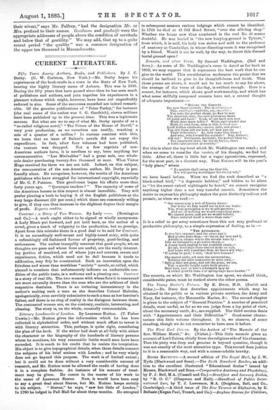Sonnets, and other Verse. By Samuel Waddington. (Bell and Sons.)--As
some of Mr. Waddington's verse is dated as far back as 1859, we may suppose that it represents the beat work that he can give to the world. This consideration moderates the praise that we should be inclined to give to its thoughtfalneas and finish. That these poems are above, it would not be too much to say far above, the average of the verse of the day, is evident enough. Here is a sonnet, for instance, which shows good workmanship, and which has what some skilfully composed sonnets have not, a central thought of adequate importance :—
" BEFORE THE OASINET.
See now these crystals Thia is celestine,— This, amethyst,—and this, yes, cinnabar;
You note the perfect shape, no Raw to mar The sheer-cut sides, the ever-glistening sheen Of point and facet ! Look, wl ere have you seen Work done more deftly ? While each crystal star
Hath its own form, deep in this Iceland-spar
Lurk hidden rainbows,—azure, gold, and green You saw them not are now, yet now you see Their iridescence ! Ay, how came they there ? And who, who formed the crystals ? Nay, forbear, Ask not ! Perchance, methinks, the powers that be, The immanent laws, the hula° forces, share
A birthright ancient as eternity."
But this is about the top level which Mr. Waddington can reach ; and when we come to consider the variety of his thought, we find but little. After all, there is little but a vague agnosticism, expressed, for the most part, in a discreet way. That Nature will be the poet's "holy place," where
" No acolyte shall swing the thur:ble.
Nor whispering worshipper his rosary tell,"
we have heard before. When we find the rook described as "a black-robed bird," "a dogmatic babbler," and bidden to be silent to "let the sweet-voiced nightingale be heard," we cannot recognise anything higher than a not very tasteful conceit. Sometimes the desire to express his philosophy makes the poet distinctly tedious and prosaic, as when we read :—
"Our senses may a web of fancies weave:
Our brain we fain would use to test our brain :
Yea, what perception is we would perceive ;
And out of nothing we would something gain : We cannot prove, and yet we would believe, Since unbelief itself Is worse than vain.'
It is a relief to get away sometimes from this not very profound or productive philosophy, to a simple expression of feeling, as in :— "THE AFTERMATH.
It was late summer, and the grass aga'n
Had grown knee-deep.-148 stood, my love and I,
Awhile in silence where the stream runs by ; Idly we listened to a plaintive strain,—
A young maid singing to her youthful swain,— Ah me, dead days remembered make us sigh,
And tears will sometimes flow, we know not why; 'It spring be past,' I said, 'shall love remain?'
She moved aside, yet soon she answered me, Turning her gaze responsive to mine own,—
' Spring days are gone, and yet the grass, we see,
Het a goodly height again bath grown ; Dear love, just so love's aftermath may be A richer growth than e'er spring-days have known.'"
The sonnets, on which Mr. Waddington has spent, we should think, considerable pains, mast be ranked above the other poems.


































 Previous page
Previous page